Hugh Hancock of Strange Company
Interview - we talk to Hugh Hancock of Strange Company to find out more about their Lithtech Film Producer software and the world of "machinima"
Over the last few years a new art-form called "machinima" has emerged on the internet, born from the computer games community and rapidly evolving from its humble beginnings, as a legion of enthusiasts around the world tried to do something more creative with games such as "Quake" than just slaughtering their opponents.
To find out more we spoke to Hugh Hancock, co-founder of Strange Company, a group which runs Machinima.com, a site dedicated to machinima, and is currently working on a new toolkit intended to make creating machinima easier than ever.
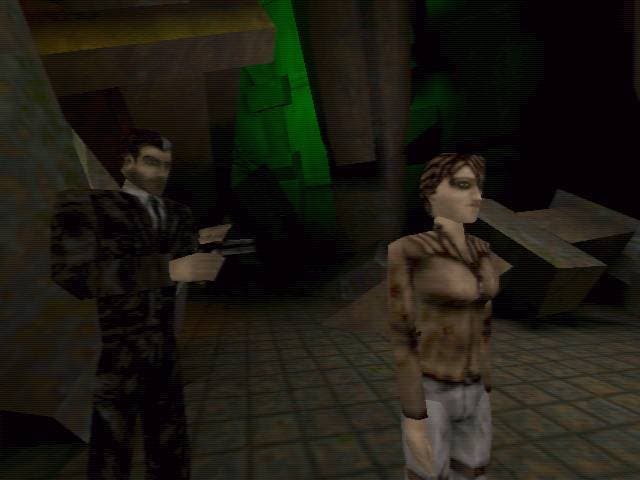
Strange Beginnings
Hugh defines machinima as "a film created using a real-time 3D engine, like the engines used in [games such as] Quake, Half-Life, Unreal Tournament, or whatever", seperating it from computer generated movies such as "Toy Story" and "Dinosaur", which are rendered a frame at a time on hugely expensive computer systems which fill entire rooms. By comparison, anyone with a half-decent PC can create machinima.
The whole machinima movement began when Quake players started tinkering with the demo facilities of the game, which allowed you to record the movements of players and monsters and then play them back at a later date. At first these were simply recorded in real time, like unedited home videos, but before long people started to create tools which allowed the demo format used by Quake to be cut, edited and spliced, as well as supporting scripted camera movements, subtitles and other new features. Things have come a long way since those early steps, and "some of the latest examples of machinima are quite stunning", according to Hugh, who recommended "Hardly Workin'" as an example of modern machinima.
The idea behind Strange Company itself began back in the summer 1997. "I was at something of a loose end, having just recovered from a bout of Repetitive Strain Injury, and was running 'News From The Front', at the time one of the UK's biggest Quake sites. I'd heard of Quake Movies, having been in the Quake scene since QTest, and when a project started up in the UK called the 'UK Quake Movie Project' (imaginatively enough), I saw the possibilities for creating something more dramatic than the skits that had previously been successful in the medium, and signed up as a writer."
"I ended up directing and producing that project, which turned into the first part of the Eschaton series, and saw that machinima had enormous possibilities as a medium that let amateur film-makers like me make epic, spectacular action films."
"It was actually some time later, during the production of 'Eschaton II : Nightfall' that I met Gordon McDonald, now the Technical Director of Strange Company, who also saw that with the advance of real-time graphics and the potential of machinima, it could turn into a true revolution in film-making, if it had enough support. Based off that vision we formed Strange Company, negotiated the license to start work on what became the Lithtech Film Producer project, started Machinima.com, and everything else that has led to us being where we are now!"
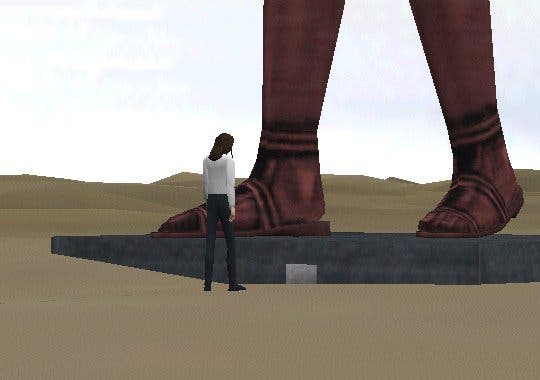
Projects
Hugh has worked on a number of machinima projects as part of Strange Company, working as a Director and Producer. Their most recent machinima short movie, "Ozymandias", was featured at the Windows 2000 launch, and "had nice things said about it by famous film critic Roger Ebert"! The company is also working on "Matrix 4x1", the first part of which is due to be released over the net within the next few days.
"The biggest projects that I've worked on to date though have been the first two parts of the apocalyptic 'Eschaton' series, based on the work of horror writer H.P Lovecraft. These still stand as some of the most technically challenging and epic machinima productions ever. Nightfall, for example, contained more frames of character animation than Quake II [the game whose engine it used]."
HP Lovecraft isn't Hugh's only inspiration though. "I've been influenced a lot by the work of David Lynch, but other influences on my work would have to include Neil Gaiman's wonderful mysticism, Tim Powers' fantasy work, comics work from Garth Ennis and Warren Ellis in particular, Katherine Bigelow's directorial style, the writing of Umberto Eco, Barbara Hambly, and films including Pi, Romeo + Juliet, Tetsuo, and David Conway's Metal Sushi. A whole bunch of stuff."
"When I'm writing or coming up with projects, I tend to enjoy Gothic and Industrial-styled modern day speculative fiction and horror, but I've also got a soft spot for epic low fantasy such as David Gemell's Drenai series. I'll try just about anything once, though."
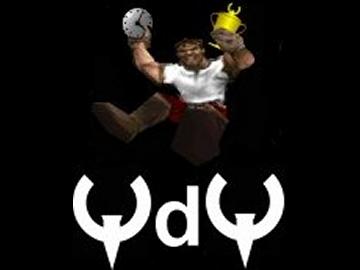
Community
Strange Company are far from the only group currently working on machinima projects at the moment though - a whole community has built up around the idea over the last few years, and things have come a long way since the first primitive "Quake Movies".
"A lot of Machinima creators and groups tend to work away quietly until they have got something impressive to show, and then suddenly pop up. In terms of groups and individuals we know about though, there are probably around 25 groups creating machinima at the moment worldwide, but I suspect there are a lot more 'bubbling under'. In particular, Unreal Tournament and Half-Life have both emerged as machinima platforms in the last nine months, and we'll probably start seeing a lot of machinima work in both of those engines over the next six to nine months."
"It's hard to say what the 'best' projects are", Hugh told us when we asked him to name a few of his favourites. "If you're wanting an introduction to the medium, I'd advise watching 'Hardly Workin'' for comedy, 'Ozymandias' for art-house fare, and either 'Rick Jones 2' or 'Quake Done 100% Quick' for action. Rick Jones has a perfect 70's funk style to it, and while QdQ doesn't have much of a plot, it does give an excellent demonstration of just how well action works in machinima."
Quake Done Quick was one of the earliest examples of in-game demos becoming a form of entertainment amongst the online gaming community, showing a player battling their way through id Software's classic first person shooter Quake in as short a time as possible. Since then they have been reducing the times still further, with the record now standing at just over 15 minutes for a run through the game, while Quake Done 100% Quicker sees the player killing every monster and finding every secret in the entire game in Nightmare mode in just under an hour!
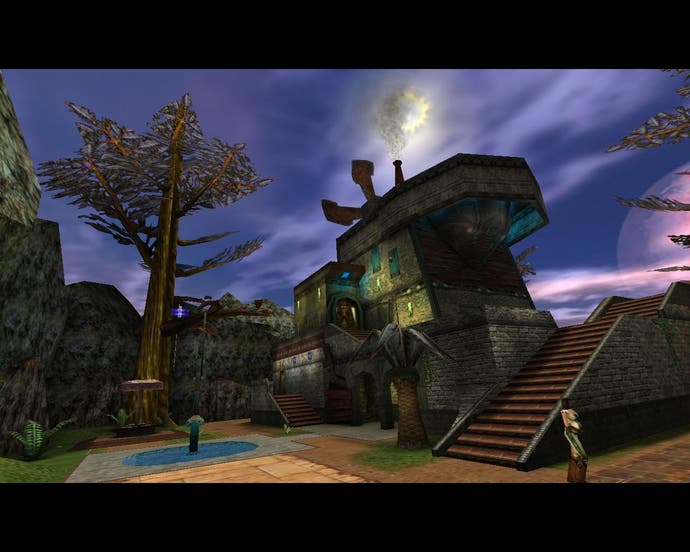
The Professionals
Machinima isn't just about amateur film makers working away in their attics though, it also covers the cutscenes used within the games. As the standard of real-time 3D graphics continues to rise, it makes more sense for game developers to create scripted sequences using the game's own graphics engine rather than seperate pre-rendered cinematics. But are they any good?
"Two months ago my answer would have been a lot more pessimistic", Hugh admitted. "But with the release of 'Star Trek : Voyager' in particular and, at points, 'Heavy Metal : FAKK2', I think that machinima in games is really looking up. Games companies seem to be realising that in-game cinematics are an art-form, and that film requires a lot of time and attention to detail, and can't just be whacked out by someone with no training in the medium. I still think we're waiting for the first truly spectacular work in the medium, but there's definitely progress happening."
"What lessons do people need to learn? Well, primarily more people need to realise that film really is hard work, and it isn't just a script with a camera pointed at it. Film language and film theory are absolutely vital if you want to make Machinima look anything above dreadful, and they take time and training to pick up."
"In terms of the companies that have already realised that, the biggest thing missing from all in-game machinima at the moment is editing. Even Voyager could have done with about another two passes through editing to tighten up the cinematics and cut down on "shoe-leather" shots. Part of the problem there is that no-one is using tools that allow non-linear editing - film editing like you see in a package like Premiere. And without that it's very hard to get a tight cut. Harsh deadlines are the enemy of tight editing, too."
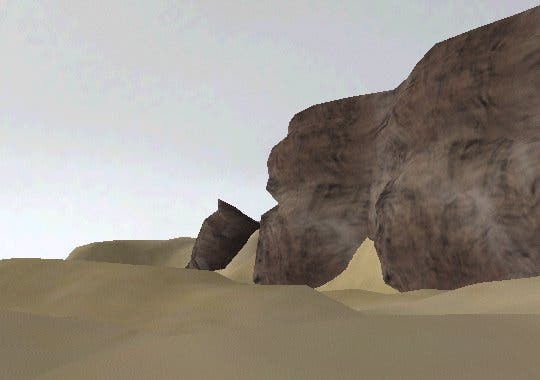
Film Producer
While the quality of machinima continues to improve, both in the hobbyist community and amongst game developers, Strange Company are hard at work on a unique new tool which should help to push it to the next level - Lithtech Film Producer.
"We realised right at the start of Strange Company's development that machinima would need a dedicated production suite if it was going to become a viable filmic medium. User-made tools and game scripting is great, but there's no way that you're going to be able to compete in as perfectionist an art-form as film unless you have tools which are as good as the tools available elsewhere in the artform. Hence, one of our major goals when we set up Strange Company was to develop that tool suite."
"We didn't have the clout to license an engine the conventional way (with a boatload of cash at the start of our development), but we did have what we considered a fantastic idea, and one which could really enhance the engine that we ended up working in. So, we contacted the makers of all the major engines and talked to them about working with them on a toolset for machinima. Monolith responded positively, and we went from there!"
"The guys over at Monolith were initially very helpful and interested, and were willing to take a chance on a slightly unusual licensing agreement and product, and obviously that was one of the reasons we decided to go with them", Hugh explained when we asked him why they chose the Lithtech engine. "In addition, the engine itself looks top-notch, and when we signed with them Lithtech 2 had just been unveiled, with a feature-list that looked like our wishlist for an engine - it literally had every feature we were looking for."
"Finally, although obviously we didn't know this when we signed up, over the time since then Monolith have really put muscle into their engine development in a lot of ways, and they've got a great attitude towards their developers. In particular, the Lith support guys are top-notch."
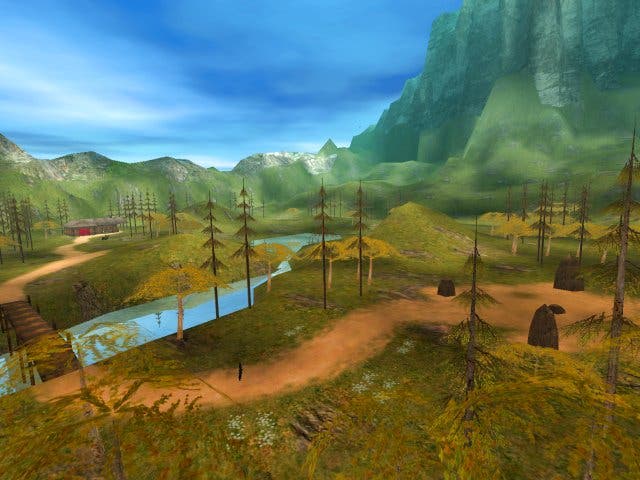
Feature
Hugh describes Lithtech Film Producer as "an integrated production suite for Machinima - aside from common tools like sound editing packages, it will ship with everything you need to make a film, from content production tools for modelling, mapping and animation, to actor scripting, through to editing and post-production".
"In addition, we will also be making the Lithtech Film Player, a package that allows viewers to watch LFP films rendered in real-time through Lithtech, available for free download. Users of the LFProducer package will also be able to output films as AVIs, for conversion to VHS, DigiBeta, MPEG, or whatever."
So how does it work? "The core of LFP is the Producer, in which you set up the shots for your film, scripting actors, cameras and so on through a keyframing system (a lot like the systems used in Flash and 3D Studio Max), and the Post-Producer, in which you edit those shots together to make a film (as you would with a conventional editing package like Adobe Premiere). The fact that we've got the two packages is actually one of the biggest advances LFP is making - by having a seperate editing package we are bringing the production process a lot closer to the process used in real film, which has been shown to enable film-makers to make much higher-quality films much more quickly than they would be able to using pure 'scripting' techniques, like the techniques used in a lot of games today."
The advantage of using LFProducer rather than simply making do with an existing game engine is that "you are using a utility that has been designed from the ground up to make machinima, that has been designed and built by people who do nothing but make machinima, and that has been designed with the intention of competing with film production packages like Premiere or Director as a production technique".
"The other really big advantage of LFProducer is that its WYSIWYG scripting is entirely done through a graphical interface that allows you to instantly see, preview and play the changes and additions you make to your scene. The instant graphical feedback makes a huge difference in what is, after all, a visual medium."
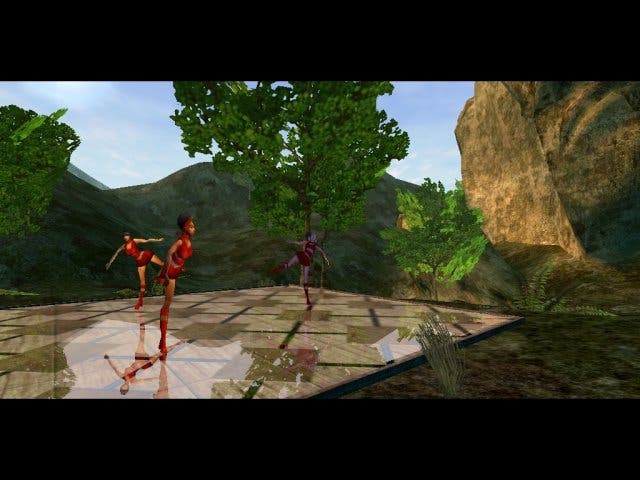
Conclusion
Lithtech Film Producer is certainly one of the most interesting uses of the Lithtech engine that we've heard about, and with a beta version planned for release "within the next couple of months" we should be able to get our hands on it soon. The plan is to sell the Producer "at around the price of packages like Paint Shop Pro, rather than 3D Studio" to keep it within the reach of amateur film-makers, while the Player software will be completely free for viewers to download.
Meanwhile machinima continues to grow and develop, and it's easy to see the excitement that surrounds it. "After all, we are talking about a medium in which you can make 'Star Wars' for not much more than the budget of 'The Blair Witch Project'! I can't wait to see what more film-makers do with it."

